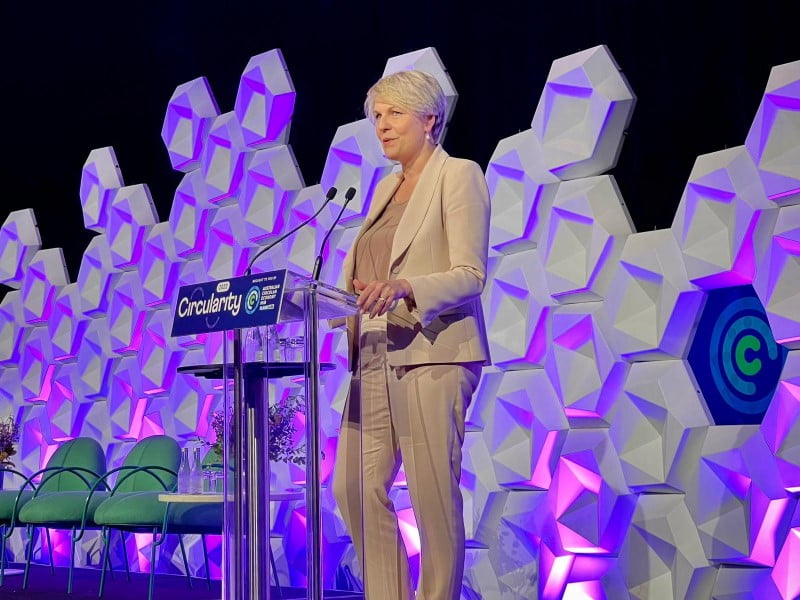A new Ministerial Advisory Group on the Circular Economy will be led by Monash Sustainable Development Institute and Climateworks Centre chair Professor John Thwaites, with Australia’s chief scientist Dr Cathy Foley and outgoing CSIRO chief executive Dr Larry Marshall also confirmed as members.
Environment minister Tanya Plibersek made the announcement in a speech at the Circularity 2022 Conference, hosted by the Planet Ark Environmental Foundation’s Australian Circular Economy Hub in Sydney on Friday.
While the group’s terms of reference are to be determined, Ms Plibersek said the group will support the federal government’s efforts to solve challenges around:
- Regulatory, commercial and other barriers to a more circular economy
- Best practice initiatives that show promise for adoption and expansion in Australia
- Circular economy research, development and innovation needs
- Effective measurement and communication about progress towards Australia’s circular economy
Ms Plibersek is expected to announce the other members of the group “shortly”. Each member will serve a two-year term and are made “on the basis of individual expertise”.
“[The advisory group] will be composed in such a way as to ensure a diverse range of skills and experience, while reflecting the whole-of supply-chain focus of the circular economy. We want people with relevant experience, with practical knowledge, and with a desire to explore new ideas,” she said.

In a separate statement, Ms Plibersek said that “better waste management and more effective recycling” are insufficient in reducing waste, meaning the country must “design-out waste in the first place, and make better use of recovered resources”.
She argued that Australians already want to cut their waste and use of disposable items “but we have to set up our economy to help them do this”, noting that 70 per cent of a product’s environmental impact is fixed during its design.
Industry and Science minister Ed Husic said that “urgent systems-wide change to how we live and work” is needed to reach Australia’s 2050 net-zero target.
“A circular economy will ensure that we are on track to make these changes and support the energy transformation. It’s a great opportunity to create manufacturing systems that are optimised to be less resource intensive, produce less waste, and have less impact on the environment,” Mr Husic said.
Professor Thwaites was the Deputy Premier of Victoria between 1999 and 2007. During that time he held several ministerial positions, including as the state’s first Climate Change minister.
He is also chair of the Commonwealth’s National Sustainable Development Council and a co-chair of the leadership council of the United Nations Sustainable Development Solutions Network, among several other board positions.
Ms Plibersek said she was pleased that Dr Foley and Dr Marshall had accepted her invitation to be members of the group.
“Dr Foley and Dr Marshall will provide a focus on innovation and design and help identify the research we need to undertake. Both are recognised scientific leaders, at the very top of their fields, and I look forward to the expertise they will bring to the table,” she said.
Ms Plibersek’s office said the establishment of the advisory group builds on the mutual commitment made at the October Environment Ministers Meeting “to work with the private sector to design out waste and pollution, keep materials in use and foster markets to achieve a circular economy by 2030”.
This includes commitments to a expand the National Waste Policy Action Plan, develop a “regulatory product stewardship scheme for solar panels and household electronics”, and reform packaging regulation by 2025 so that it can be “recovered, reused, recycled and reprocessed safely in line with circular economy principles”, among others.
The federal government’s National Waste Policy Action Plan includes several 2025 and 2030 targets for the reduction of plastic in packaging and to increase the rate at which plastic packaging is recycled. By 2030, the government wants an average recovery rate of 80 per cent across all waste streams.
According to the Australian Packaging Covenant Organisation estimates, Australia will only reach half of its target to recycle or compost 70 per cent of plastic packaging by 2025. The group estimates that only 16 per cent of plastic packaging was recovered through recycling in 2021.
On Friday, the Australian Competition and Consumer Commission approved the formation of a Coles, Woolworths and ALDI Soft Plastics Taskforce in response to the announcement that soft plastics recycling initiative REDcycle had been paused.
Last Thursday, Ms Plibersek announced the government had joined the High Ambition Coalition to End Plastic Pollution treaty, co-chaired by Norway and Rwanda, to end plastic pollution around the world by 2040.
In the government’s October budget, the Albanese recommitted an additional $60 million over four years to the Recycling Modernisation Fund, which was initially made in the Coalition’s budget in March.







